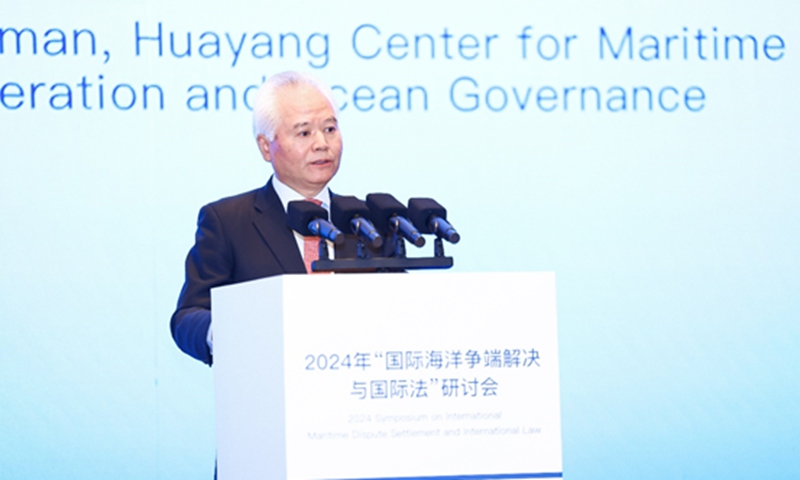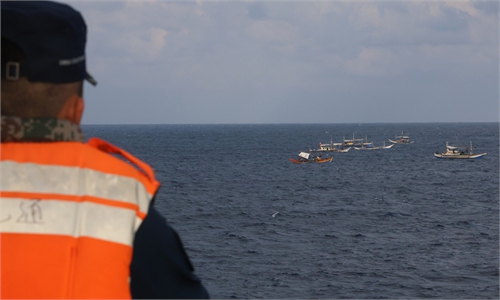Major turmoil in S.China Sea unlikely in short term, but certain countries should not harbor illusions, says expert

Wu Shicun at 2024 Symposium on International Maritime Dispute Settlement and International Law held in Beijing on December 16.
Major turmoil in the South China Sea is unlikely to occur in the near term, and China has the capability to maintain peace and stability in the region. However, certain countries should not harbor any illusions, as China will respond decisively to actions that infringe upon its rights and claims, Wu Shicun, chairman of the Huayang Research Center for Maritime Cooperation and Ocean Governance, told the Global Times during the 2024 Symposium on International Maritime Dispute Settlement and International Law held in Beijing on Monday.
The senior maritime expert believes that year 2024 marked a turning point for security situation in the South China Sea. "Since the illegal ruling of the 2016 arbitration, China has taken a series of measures to stabilize the situation and stabilize relations between China and the claimant countries. However, in 2024, the trend toward stabilization in the South China Sea has to some extent been reversed. This is evident from the frequent provocations by the Philippines around Huangyan Dao and Ren'ai Jiao. He added that in the future, this situation may continue, however, major turmoil in the South China Sea is unlikely to occur in the near term, and China has the capability to maintain peace and stability in the region.
The Philippines passed two laws - the Philippine Maritime Zones (PMZ) Act and the Philippine Archipelagic Sea Lanes (PASL) Act - on November 8, in an attempt to solidify the illegal ruling of the 2016 arbitration case through domestic legislation, illegally including China's Huangyan Dao and most of the islands and reefs in the Nansha Islands and their related waters in its maritime zones.
In a countermeasure response, China on November 10 released the baselines of the territorial sea adjacent to Huangyan Dao, and the China Coast Guard (CCG) has stated it will continuously strengthen patrols and law enforcement in the territorial waters of Huangyan Dao and related maritime areas.
China also deposited to the UN the Statement on the Baselines of the Territorial Sea Adjacent to Huangyan Dao and the Chart on December 3.
"If the Philippines undertakes further provocative actions at Ren'ai Jiao in 2025, the possibility cannot be ruled out that China may take measures such as removing the Philippine military vessel that has been illegally 'grounded' there for decades," said Wu. He emphasized that certain countries should not harbor any illusions, as China will undoubtedly take action against any infringement of its rights and claims.
Wu believed that there will be a "window period" for joint development and exploration in the South China Sea among surrounding countries in 2025. Wu noted that in 2024, China, Vietnam, Indonesia, and other countries mentioned in their joint statements the intention to engage in joint development at sea.
The joint statement between China and Vietnam issued on October 14 mentioned to promote consultations on maritime joint development and to make substantial progress in the delimitation of maritime areas outside the Beibu Gulf, actively advancing cooperation in low-sensitivity maritime areas and enhancing maritime search and rescue cooperation.
On November 9, China and Indonesia issued a joint statement, according to which, the two sides reached important common understanding on joint development in areas of overlapping claims.
"This is a very important sign, especially regarding the content of joint development in maritime areas with overlapping claims in the China-Indonesia joint statement. Maritime joint development cooperation is crucial for all parties involved, as the disputes in maritime areas with overlapping claims in the South China Sea are extensive and involve multiple countries, making it difficult to resolve all disputes in a short time, or even in coming generations. Countries will certainly have to return to the path of cooperation; it is only a matter of time. If China and Indonesia, as well as China and Vietnam, can ultimately bring about cases of joint maritime cooperation and development, it will have a very positive demonstration effect," Wu said.
Wu said he has just returned from the US after attending an exchange meeting. He told Global Times reporters that several American scholars believe that the US will not "scale back" its offensive against China regarding the South China Sea issue in 2025.
"Previous analyses suggested that in 2025, US pressure on China will focus more on economic and trade issues, while actions on the South China Sea issue would weaken. However, American scholars I met with generally disagree with this view. The US will not change its direction of exploiting the South China Sea issue to contain and suppress China; it will not allow the outside world to perceive a weakening of the US-Philippines alliance. The only uncertainty is whether it will adopt new means and methods," Wu said. He added that China must prepare to respond in all aspects to face the unpredictability of the future.


